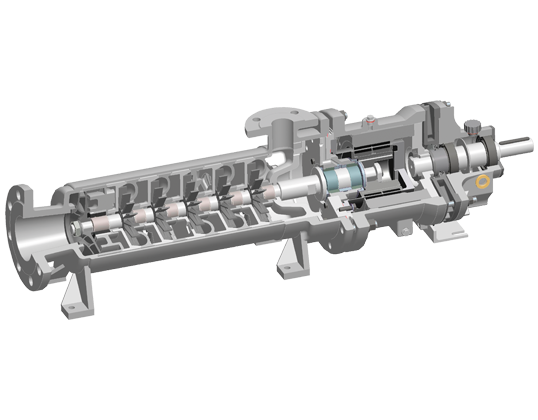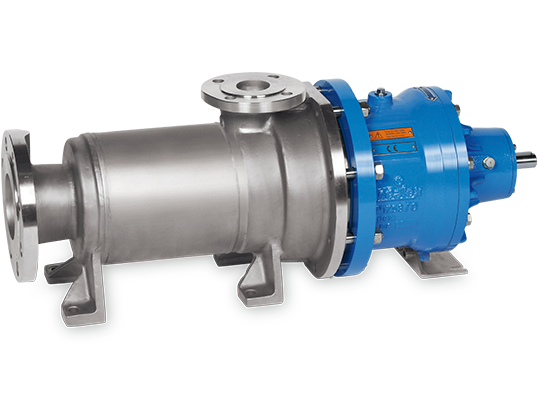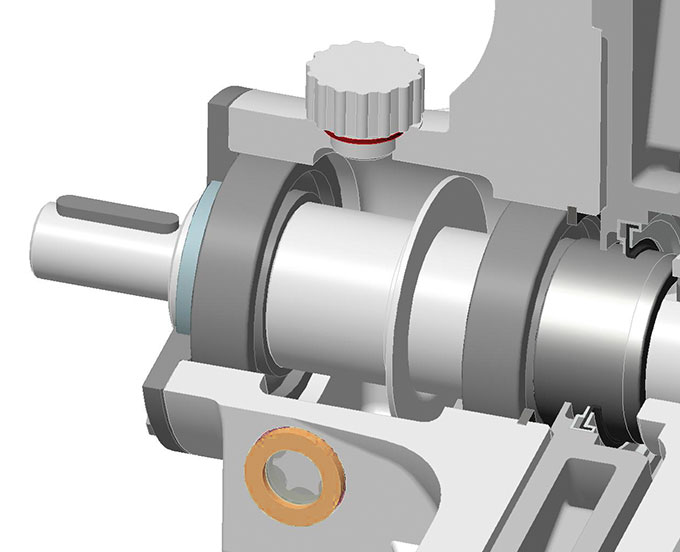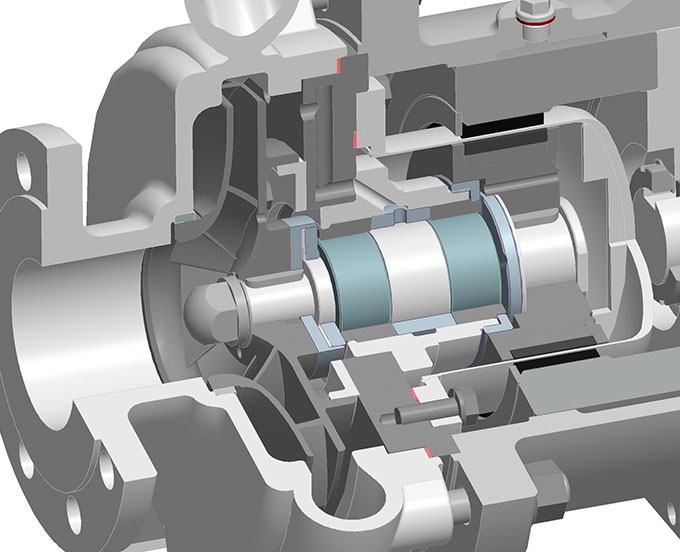Flow Rate
max. 42 m³/h
Delivery Head
max. 470 m L.C.
Temperature Range
-120 °C to +250 °C
Pressure Rating
max. PN 400
KEY FACTS
-
Design according to DIN EN ISO 15783
-
Maintenance-Free Permanent Magnet Drive
-
Modular Design
-
No Dynamic Seal, Separation of Liquid Chamber and Atmosphere by Means of Containment Shell
-
Barrel Design Version with only two static Seals
-
Impeller Arrangement in Series; max. 8 Stages
-
Self-Priming; First Low-NPSH Stage for Improved Suction Performance











DESIGN
- Side-Channel Centrifugal Pump in Process Design
- Self-Priming
- Impeller Arrangement in Series; max. 8 Stages
- Barrel Design Housing with just Two Static Seals
- Gas Handling
- First Low-NPSH Stage for Improved Suction Performance
- Synchronous Permanent Magnet Drive
- Easy to Maintain
- Seperation of Liquid Chamber and Atmosphere by Means of Isolation Shell
- Bearing Bracket with Oil-Lubricated or Greased-for-Life Anti-Friction Bearings; Optional: Close-Coupled Design
- Product-Lubricated Journal Bearings; Made of Silicon Carbide (SSiC); Customized Materials (e.g. Carbon, WOC etc.) on demand
OPERATING RANGE
| FLOW RATE | Q | 42 m³/h |
| DELIVERY HEAD | H | max. 470 m L.C. |
| TEMPERATURE | t | -120 °C to +250 °C |
| PRESSURE RATING | p | max. PN 400 |
Higher flow rates upon request.
TYPICAL APPLICATION
- Acids
- Lyes
- Hydrocarbons
- Solvents
- Liquid Gases
- Refrigerants
CUSTOM MATERIALS
| Casing elements: | 315 SS |
| Impeller/Paddle wheels: | 316 SS |
| Containment shell: | 316 Ti/Hastelloy C4 |
| Magnet carrier: | 316 Ti |
| Radial journal bearings: | Silicon Carbide |
| Intermediate lantern: | Nodular Iron |
| Bearing carrier: | Ductile Iron |
Further materials upon request.
Flow Rate
max. 42 m³/h
Delivery Head
max. 470 m
Temperature Range
-120 °C to +300 °C
Pressure Rating
max. PN 400
key facts
- No Alignment between Pump and Motor
- No Coupling and Coupling Guard
- No Ball Bearings
- Pump does not require scheduled Maintenance
- No Oil Lubrication necessary
- Lower noise level
- High Stiffness of the Pump Shaft because of small overhung compared to Pumps with Shaft Seals
- Use of standard high efficient IEC and NEMA Motors contrary to canned Motors
- Better availability with standard Motors
- Maintenance of Motors is standardized and can be done by the customer on site
- Base Plates for Close-Coupled Design do not need to be rigid acc. to API 685 – 7.3











DESIGN
- Process oriented design
- Self-priming
- Barrel design
- 1 - 8 stages
- Only 2 static seals
- Magnet drive
- Leakproof
- Horizontally mounted
- Modulares Baukastensystem
- Bearing Bracket with Oil-Lubricated or Greased-for-Life Anti-Friction Bearings
OPERATING RANGE
| Flow Rate | Q= | 42 m³/h |
| Delivery Head | H= | max. 470 m |
| Temperature Range | t= | -120 °C bis +300 °C |
| Pressure Rating | p= | max. PN 400 |
Higher flow rates upon request
TYPICAL APPLICATION
- Acids
- Lyes
- Hydrocarbons
- Solvents
- Liquid Gases
- Refrigerants
CUSTOM MATERIALS
| Gehäuseteile: | 1.4408 |
| Laufrad/Flügelräder: | 1.4408 |
| Spalttopf: | 1.4571/2.4610 |
| Magnetträger: | 1.4571 |
| Gleitlagerung: | Siliciumcarbid |
| Zwischenlaterne: | 1.0619 |
NACHSETZZEICHEN (AUSFÜHRUNGEN):
| H1 | heated pump casing |
| H2 | jacketed bearing lantern |
| S | thermal barrier without secondary seal |
| W | thermal barrier with secondary seal |
DESIGN VARIANTS
The pumps are outfitted with a heat jacket and pump casing (H5) and/or a heat jacket in the bearing lantern (H2). Both heat jackets can be realized either separately or in conjunction with a bypass line. The heat jackets in the standard construction are rated for operating pressure of 16 bar at 200 °C (steam) or 6 bar at 350 °C. The heat jackets can also be used for cooling.
The thermal barrier acts as a structural element between the bearing carrier (in the bearing carrier model) or drive motor (in the close coupled model), whereas the hydraulic system allows for heat transfer. This reduces ball bearing temperatures in the gearing when hot liquids are being transported. A radial shaft sealing ring can also be integrated into the thermal barrier for purposes of sealing the magnet driver. The sealing ring acts as a secondary seal that prevents the product from leaking into the environment through a leak in the isolation shell. In order for this secondary seal to be used, the magnet driver chamber must be monitored so that leaks can be detected in good time.
The double isolation shell should be used in situations requiring a high level of safety. The unit consists of two interlocking isolation shells, both of which are rated for the relevant operating conditions. If one of the two units is damaged, the casing still remains leaktight. The gap between the two units can be monitored.




